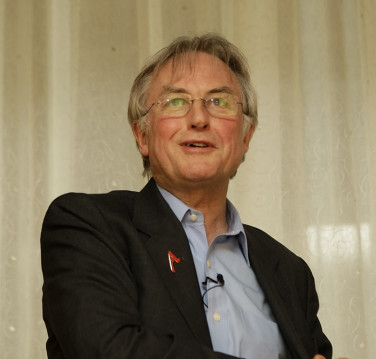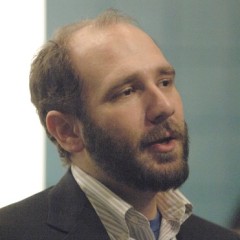Today’s guest column is written by Josh Rosenau, Programs and Policy Director for the National Center for Science Education. The views expressed in this piece belong to Rosenau and do not necessarily reflect those of his employer.

Richard Dawkins at the 34th American Atheists Conference in Minneapolis in March 2008. Photo courtesy of Mike Cornwell via Wikimedia Commons.
Since joining Twitter, Richard Dawkins has courted controversy by trivializing some forms of rape and pedophilia, blaming some victims of sexual assault for the crimes committed against them, and endorsing the eugenic notion of aborting any fetus diagnosed with Down syndrome (“abort and try again,” he advised).
In a recent interview with Religion News Service, Dawkins stood behind those statements, but added, “I would not say it again, however, because I am now accustomed to being misunderstood.”
For 13 years, Dawkins served as the Simonyi Professor for the Public Understanding of Science—an endowed chair at Oxford created specifically for him. That honor followed a career as a science communicator, built through a series of books, television and radio programs, and other outreach that connected audiences to the joy of science—the “appetite for wonder” that gives his recent memoir its title.
Ask scientists who came of age after The Selfish Gene hit the shelves what started their early interest in biology, and many will cite Dawkins’s work like The Blind Watchmaker and River Out of Eden. Likewise, the surge of vocal atheists after 9/11 has been attributed in large part to his book The God Delusion.
After such a career, he should expect to be understood—and with that experience under his belt, his audience is entitled to expect him to communicate clearly.
Given that context, what if Dawkins was not misunderstood, but was understood quite clearly?
What if, instead, he simply cannot grasp that so many people who agree with him about science—and perhaps even about religion—would disagree with him on other topics?
Eight years ago, reviewing Dawkins’s The God Delusion, I argued that one of the book’s central flaws was that Dawkins “doesn’t quite seem interested in understanding the beliefs of people who aren’t Richard Dawkins.” What if that’s still the problem, just translated from religion to a wider range of social issues?
Indeed, that problem may have deepened, as his latest remarks betray a lack of self-awareness, too.
“I feel muzzled, and a lot of other people do as well,” he told RNS. “There is a climate of bullying, a climate of intransigent thought police which is highly influential in the sense that it suppresses people like me.”
In addition to his bestselling books, his dozen or so movies and TV series, his appearance on The Simpsons, the professorship endowed on his behalf, and his foundation with its near $1 million budget, Dawkins also draws an audience of over a million followers on Twitter, and reportedly commands speaking fees in the neighborhood of $20,000. We should all be so muzzled.
Dawkins famously helped support ads on London’s buses declaring “there is probably no God,” advocated arresting the previous pope on his visit to the UK, declared Islam “one of the great evils in the world,” and pronounced that belief in a personal deity is a form of “delusion.” His would not seem to be a voice that’s easy to suppress—nor does the outrage at his thoughtless remarks seem to have stemmed their flow on Twitter.
When considering what Dawkins describes as suppression and bullying, it is worth looking at some other recent incidents of unambiguous online bullying. Under the guise of addressing “ethics in video game journalism,” a campaign of harassment against female game developers and scholars raged for months, but only burst into the public eye after a feminist video game scholar had to cancel a public event due to threats of a mass shooting. Within the worlds of atheism and skepticism, where women are under-represented, efforts to address sexual harassment and build more inclusive communities have led to conflict and schism. Male advocates for feminist principles within the community have not faced anywhere near the level of vitriol that some women have endured, and thus many trivialize or dismiss those women’s experiences.
This disparity between the way people respond to men’s voices and women’s voices on the same issue crops up frequently, and creates a challenge for anyone trying to draw general lessons from their own experience on such fraught topics. Crossing those boundaries—whether of gender or sexuality or religion—requires effort, empathy, and care.
What makes Dawkins such an amazing and successful science communicator is his ability to put himself in the place of a nonspecialist, and find words and metaphors that illuminate science for anyone. We can only hope he will find a way to apply that remarkable capacity to other realms.
Josh Rosenau is an evolutionary biologist and a staffer at the National Center for Science Education, where he defends evolution in public schools. He is also a board member of Bay Area Skeptics, a science blogger, and works with scientists, skeptics, and others to spread the joy of science.





